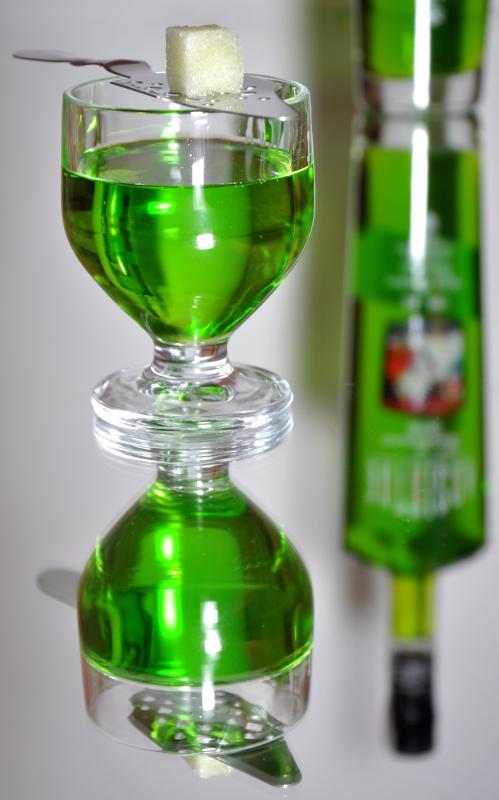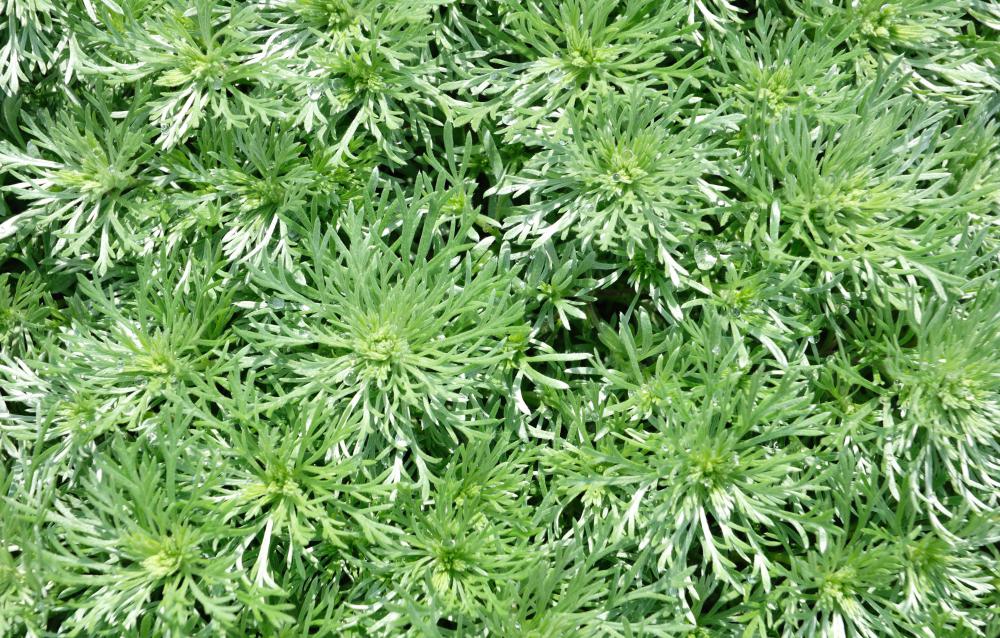At AllThingsNature, we're committed to delivering accurate, trustworthy information. Our expert-authored content is rigorously fact-checked and sourced from credible authorities. Discover how we uphold the highest standards in providing you with reliable knowledge.
What is Wormwood?
Many plants in the genus Artemisia are known as “wormwood,” although most people use the term specifically to refer to A. absinthium or grande wormwood, the primary active ingredient in absinthe. This variety has been used medicinally in a variety of ways for centuries, and despite concerns about its health risks, few studies have really examined the plant and its compounds closely.
Wormwood is native to Europe, although it has since spread to Asia, Africa, and North America. It grows primarily in temperate zones, and readily takes over when given a chance to do so. People can recognize the plant by its shrub-like look, tall gray-green hairy stems, and lobed yellow green leaves, which are typically arranged in a spiral pattern around the stems. It also has a very distinctive sharp, spicy odor that some people describe as bitter or acrid.

The plant prefers full sun, and it likes to grow in dry soil. Wormwood often grows very well in poor soil, taking over where other plants cannot grow, although it prefers medium-weight soil which is high in nitrogen. In temperate zones, the plant will grow as a perennial, while in colder zones, it may die off during the winter, due to frost. Its bitter flavor and odor, incidentally, makes it an excellent method of natural pest control.

A number of cultures have used wormwood in various medical applications. The plant has historically been used in tisanes and tinctures for things like labor pains, digestive problems, and cardiac issues. Wormwood's effectiveness as a treatment for these conditions has not been proved, and because compounds in the plant can potentially be toxic, these treatments should only be undertaken with caution, with the products prepared by skilled herbalist. Pure extract should never be consumed.

The main toxin of concern in wormwood is thujone, the same compound that allegedly makes absinthe a hallucinogen. In fact, thujone does not appear to have hallucinogenic properties, but in large amounts, it can cause damage to the nervous system, resulting in convulsions, loss of muscle control, and sometimes death, if enough is involved. The amount of thujone in absinthe is typically quite minimal, as wormwood is only one of an assortment of herbs macerated in alcohol to yield this spirit.
Frequently Asked Questions
What exactly is wormwood?

Wormwood is a herbaceous perennial plant known for its silvery-green leaves and aromatic oils. It's scientifically named Artemisia absinthium and belongs to the daisy family. Historically, it's been used for medicinal purposes, including as a digestive aid, and is famously an ingredient in the spirit absinthe, which was once thought to cause hallucinations.
Can you consume wormwood safely?
Wormwood can be consumed safely in moderate amounts, particularly when used as a flavoring in spirits like absinthe, which no longer contains the potentially harmful compound thujone in significant amounts. However, the pure essential oil and high concentrations of wormwood should be avoided due to potential toxicity and side effects such as seizures and renal failure.
What are the medicinal benefits of wormwood?
Wormwood has been traditionally used for its digestive properties, helping to relieve indigestion and stimulate appetite. It also has anti-inflammatory and antimicrobial effects. According to some studies, wormwood may help in treating Crohn's disease and other digestive disorders, but more research is needed to fully understand its therapeutic potential and safety.
Is wormwood related to any risks or side effects?
Yes, wormwood can pose risks if consumed inappropriately. The compound thujone, found in wormwood, can be neurotoxic in high doses, leading to side effects like muscle spasms, dizziness, seizures, and even kidney or liver damage. It's important to use wormwood under the guidance of a healthcare professional to avoid these risks.
How is wormwood used in absinthe and is it legal?
Wormwood is a key botanical in absinthe, providing its characteristic bitter flavor. The production of absinthe was once banned in many countries due to health concerns associated with thujone, but modern regulations have allowed its legal return, provided the thujone content is below the maximum threshold set by local laws, which varies by country.
Can wormwood be grown at home, and if so, how?
Yes, wormwood can be grown at home quite easily. It thrives in well-drained soil and full sun, making it suitable for many temperate climates. It's drought-resistant and generally low-maintenance. Regular pruning helps maintain its shape and encourages new growth. It's also known to repel pests, making it a beneficial plant for gardens.
AS FEATURED ON:
AS FEATURED ON:














Discuss this Article
Post your comments